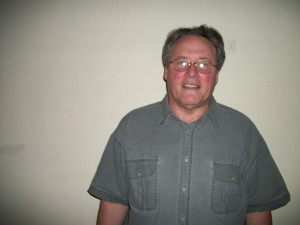Joan Hanna: Patrick, we were thrilled to have your essay The End of the War as part of our military and war themed issue. One of the things that struck me while reading this piece was the correlation between your time in Vietnam and the death of your mother. Can you share with our readers how these two incidents came together in this story?
Patrick Cook: Thanks for this opportunity, Joan. I don’t get published so often, so this is a big thrill. Of course the surface connection between my time as a hospital corpsman on the USS Sanctuary and my mother’s death is that these experiences were both nursing. The more important connection, though, is that they were both times of profound emotional involvement. I remember standing on the deck of the Sanctuary, looking at one of the glorious tropical sunsets. The way the light shone through the clouds, glowing dark red, reminded me of the deep exit wounds caused by an AK 47 round through a patient’s thigh. I had to turn away from the sunset. Too many /images like that were burned into my brain.
Incidents in my mom’s care, even things that weren’t that similar, inevitably reminded me of my time in Vietnam. Long watches in the night, seeing her in pain even through the morphine—the connections kept bubbling up. I felt the emotions again, remembered the scenes again.
JH: I love the parallels and contrasts in your story. There is a tactile sense of responsibility between the two memories. Can you elaborate a little on how you think that incident in Vietnam may have affected your response to your mother’s illness?
PC: I’m glad you picked up on the sense of responsibility that runs through the essay. Nursing is very important in the healing of wounded patients. For the first time in my life, things I did were truly vital, actions that could mean life or death. I wasn’t that young—I turned 24 that year—but it was the first time I had to act like an adult. In the same way, nursing my mother was a maturing event. Her death meant not only that she depended on me, but also that I could no longer depend on her. Again, it was time for another step into maturity, into responsibility.
JH: There are often conflicting emotions with siblings when a parent is ill and you illustrate this well in your story. You also have the added layer of your response to this incident shadowed by your experiences in Vietnam. Do you think your siblings understood how your service in Vietnam affected your reaction to your mother’s illness even though it was so many years later?
PC: We were concentrating on helping Mom get through this. I don’t think my extra private pain came into the picture. Actually, I hope it didn’t. I was impressed by my sisters-in-law, who demonstrated their kindness and love so clearly, by my brothers and my sister, who cooperated so well. I think we were all trying to be extra careful, because we knew this was one of those times when misunderstandings arise, and cause pain for years. One more thing to recover from, and we didn’t need that.

JH: Sometimes we feel that we are able to handle trauma with a certain sense of detachment because of experiences we have had. For instance, someone with medical training could be considered somewhat of an expert and is expected to handle a personal trauma more easily. Your story illustrates that our experiences don’t always give us a strong foundation for dealing with trauma in our own lives. Can you describe how personal trauma affects you as a writer?
PC: I’ll make one of those blanket statements, which is almost entirely true. Personal trauma is the only reason I write—to express a pain that readers can understand and recognize in their own lives. This is true even of my humor pieces. Yes, I write humor, too. It’s harder than a straight narrative. But even in a funny piece, my account of frustration with bureaucrats or my garden is ultimately based on some kind of pain.
JH: Do you have any other stories, publications or websites that you would like to share with our readers?
PC: Some years ago, I published a piece on the very different circumstances of my younger brother’s death. You can find “The Mayor of Gardenville.” at www.conteonline.net. For the funny stuff, go to www.fonsandporter.com for “Laments of a Quilter’s husband.”
JH: Patrick, thank you for sharing your story with our readers. We were delighted to have you as part of our winter issue and we especially thank you for sharing such personal thoughts and feelings about your essay. Just one final question: could you share with our readers what recovery means to you?
PC: I’ve had a lot of opportunities to recover. I handled some of them better than others. I’ve been sober for twenty-six years now. I was able to stop smoking. I don’t get a sinking feeling when I hear a helicopter any more. Most of all, I’m able to use traumatic experiences to make a kind of art. That helps a lot in my recovery. Thanks again for publishing my essay, and for giving me the opportunity to talk about it.


Pingback: “The End of the War” by Patrick Cook | Rkvry Quarterly Literary Journal